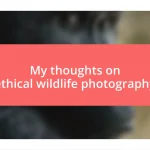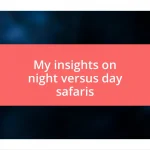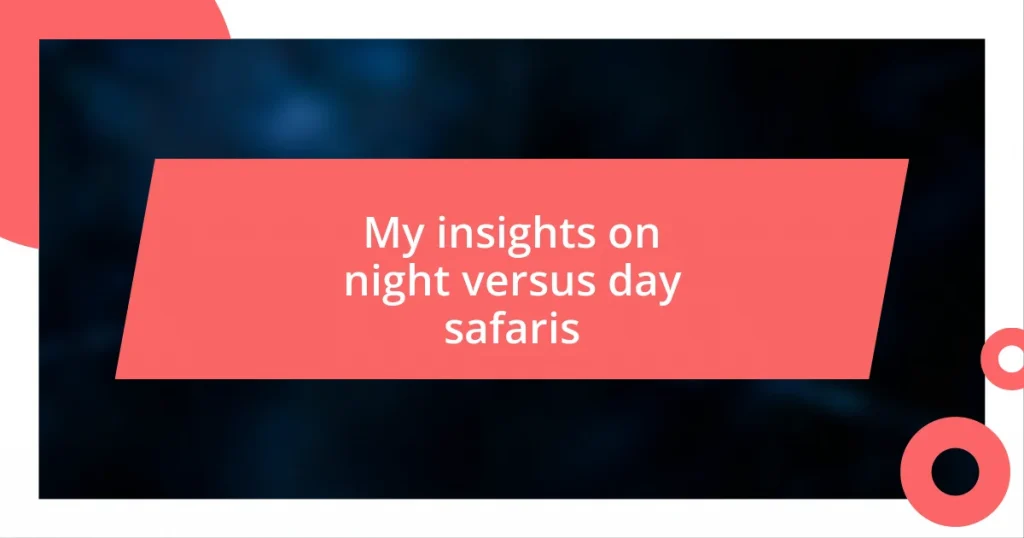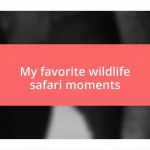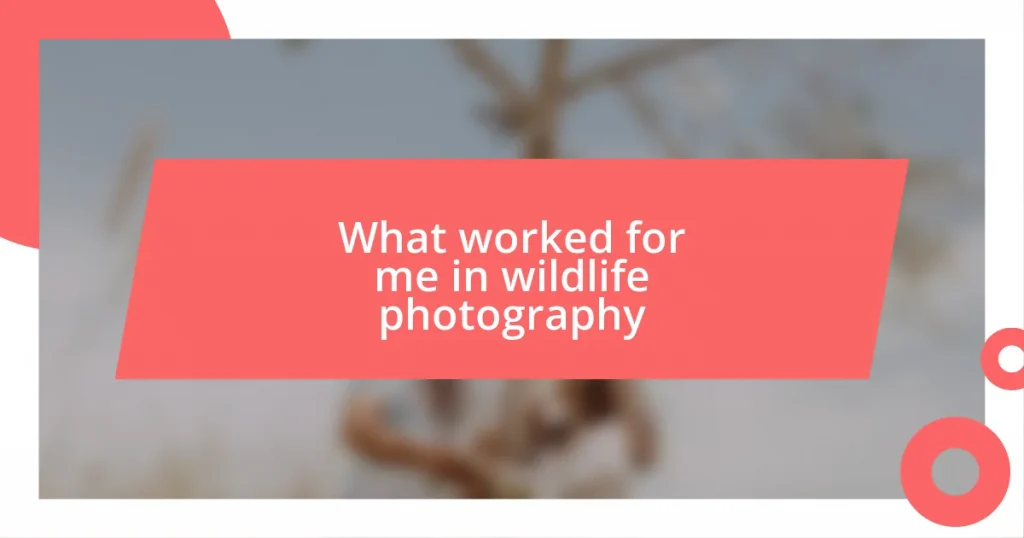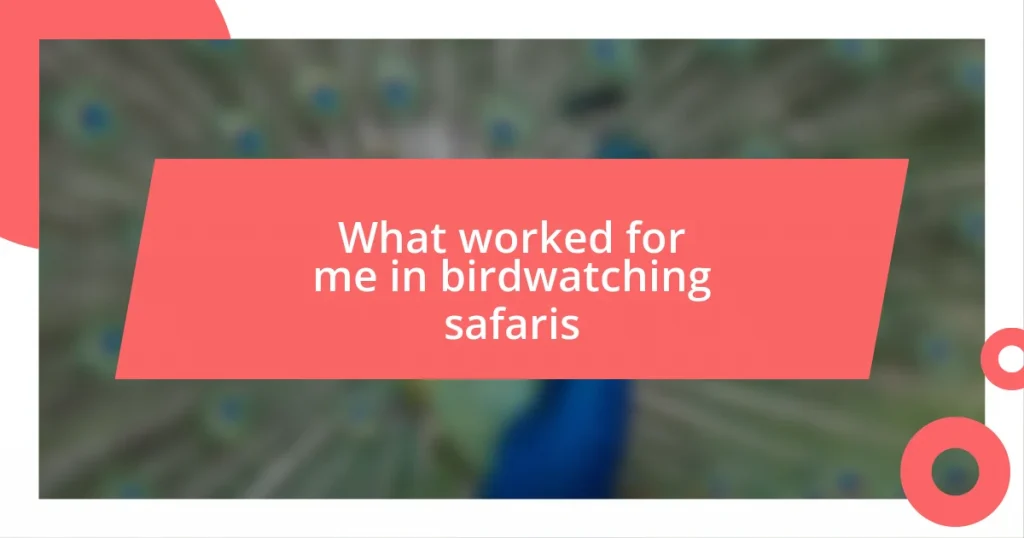Key takeaways:
- Day safaris provide vibrant, immersive wildlife experiences with active animal behavior and scenic beauty, fostering a sense of connection to nature.
- Night safaris offer unique thrills, less crowded encounters, and opportunities to observe elusive wildlife behaviors under the cloak of darkness, enhancing sensory awareness.
- The best wildlife viewing times vary; early mornings and dusks are prime for activity, while harsh midday heat often leads to quieter moments in nature.
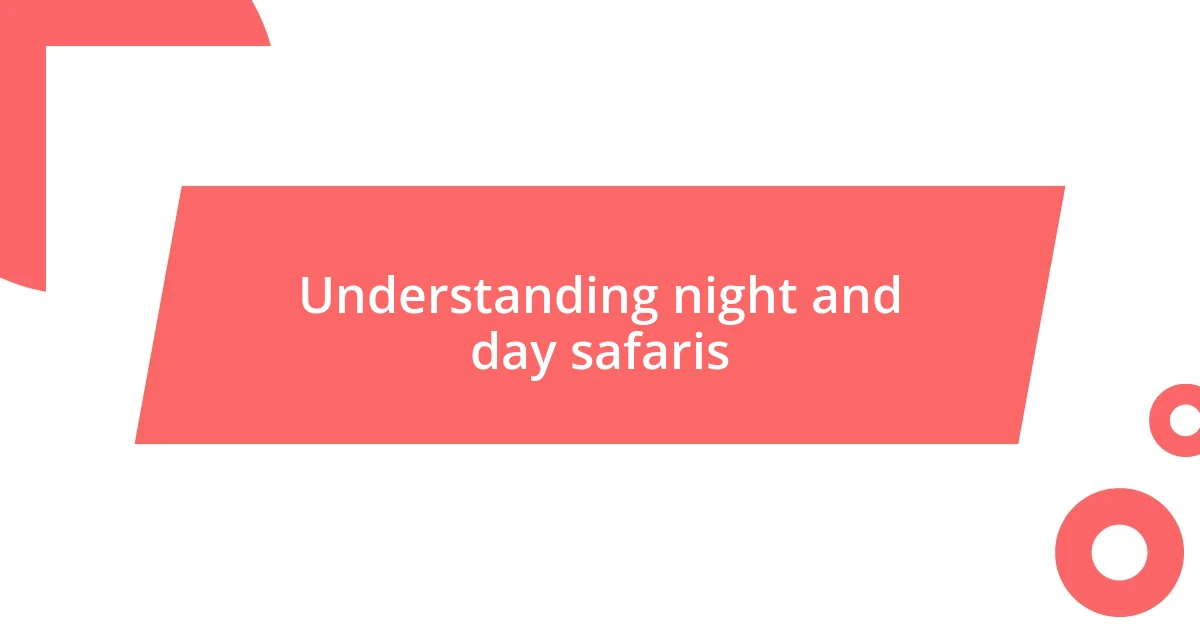
Understanding night and day safaris
When it comes to understanding night and day safaris, one cannot overlook the profound differences in experience each offers. I remember my first day safari vividly; driving through the sun-drenched savannah, wildlife was abundant, and the vibrant colors of the landscape left me in awe. Can you imagine witnessing a pride of lions lounging under a tree, basking in the warmth of the sun? It’s a sight that fills you with a sense of wonder.
Conversely, I found night safaris to be a completely different world altogether. As darkness envelops the landscape, the atmosphere transforms, and I felt a thrill as the guide shined the spotlight into the dusky brush. Suddenly, the haunting calls of nocturnal creatures filled the air, and I was mesmerized by the sight of a leopard stealthily prowling in search of prey. Don’t you think there’s something exhilarating about the unknown in the dark?
Exploring the contrasts between these two types of safaris, I often reflect on the emotions they evoke. Day safaris tend to be a feast for the eyes, overflowing with life, while night safaris tap into our primal instincts, exhilaration, and even a tinge of fear. Each offers a unique narrative of nature, and I can’t help but wonder: which one resonates with you more?
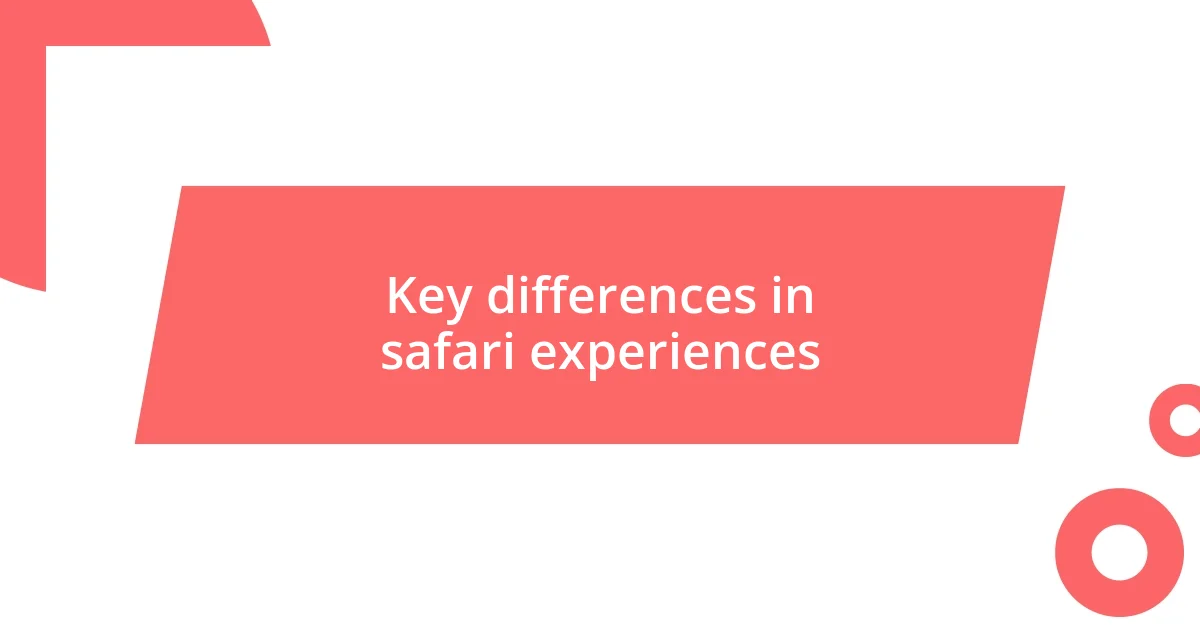
Key differences in safari experiences
The ambiance during a day safari is strikingly bright and lively. I recall my excitement when I spotted elephants splashing in a waterhole, their playful antics bringing smiles to our group. The vibrant colors of the landscape and the diverse wildlife create a sense of joy and energy that’s hard to match. Isn’t it incredible to feel that connection with nature in such a lively setting?
On the flip side, night safaris offer a sense of mystery and suspense that captivates like no other. I’ll never forget the shiver down my spine when we heard the roar of a lion echoing through the darkness. The thrill of tracking elusive creatures with only a beam of light added a layer of adrenaline to the adventure. Have you ever felt a rush of excitement alongside a touch of fear? It’s that blend that makes night safaris so uniquely intriguing.
In considering both experiences, it’s fascinating to note how they cater to different aspects of our nature appreciation. Day safaris are about observation and witnessing the grandeur of wildlife in full view, while night safaris unleash our exploratory instincts. I find myself leaning toward one based on my mood—sometimes lounging under the sun feels simply right, but other times, the pull of the hidden world beyond daylight is irresistible.
| Aspect | Day Safari | Night Safari |
|---|---|---|
| Atmosphere | Bright and vibrant | Mysterious and suspenseful |
| Wildlife Activity | Active and visible | Elusive and stealthy |
| Lighting | Natural sunlight | Artificial light |
| Experience Type | Observational and scenic | Adventurous and thrilling |
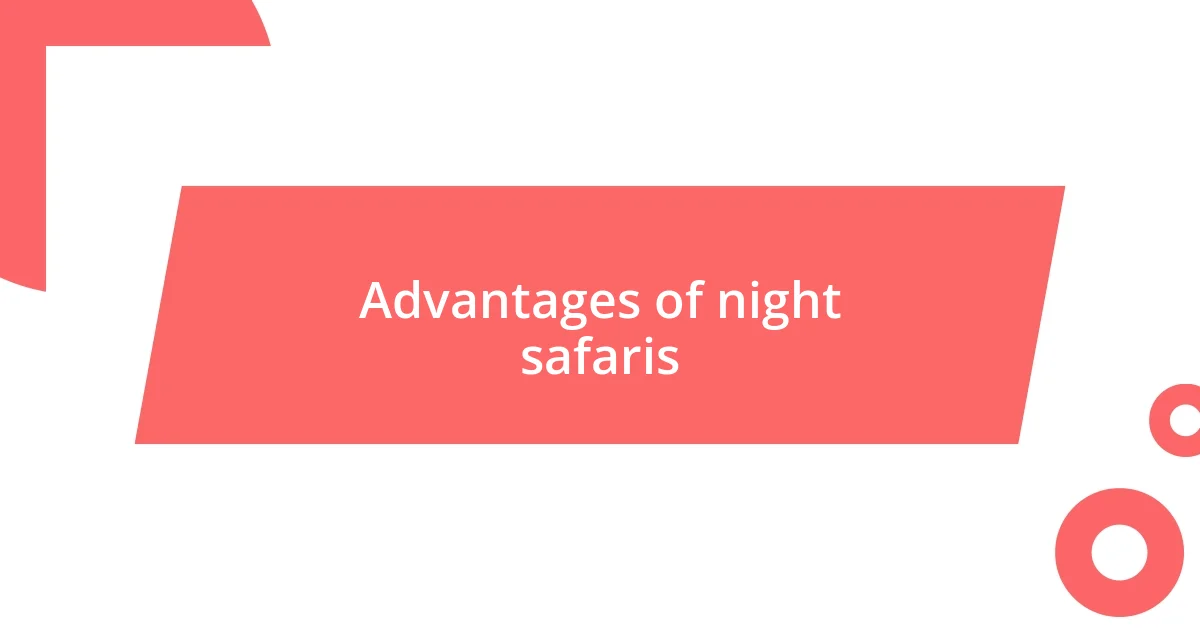
Advantages of night safaris
Experiencing a night safari is like stepping into a different dimension. The thrill of exploring the wildlife under the cloak of darkness invokes a sense of adventure that day safaris simply can’t match. I distinctly remember the heart-pounding moment when our guide illuminated a pair of glowing eyes in the distance. At first, my breath hitched; then, a wave of exhilaration washed over me as I realized we were witnessing a night hunter in its element.
The advantages of embarking on a night safari are numerous:
- Unique Wildlife Behavior: Many animals, such as leopards and owls, are more active at night, offering the chance to observe behaviors you wouldn’t see during the day.
- Less Crowded: The reduced number of vehicles at night means a more intimate and personal experience with nature, allowing you to truly connect with the surroundings.
- Enhanced Senses: The darkness sharpens your senses, making sounds more pronounced. I’ll never forget the symphony of night calls that seemed to dance in the air, heightening my awareness of the wild.
- Stargazing Opportunities: The clear night skies in many safari regions reveal a breathtaking canvas of stars, adding a magical touch to the entire experience.
- Thrill Factor: The combination of the unknown and the thrill of tracking animals in the dark can be incredibly exhilarating, transforming an ordinary outing into a heart-racing adventure.
Night safaris invite you to embrace your instinctual side, igniting that thrill of uncertainty, which I find truly captivating. There’s something about the interplay of shadows and light that draws you deeper into the wilderness, making each moment feel alive.
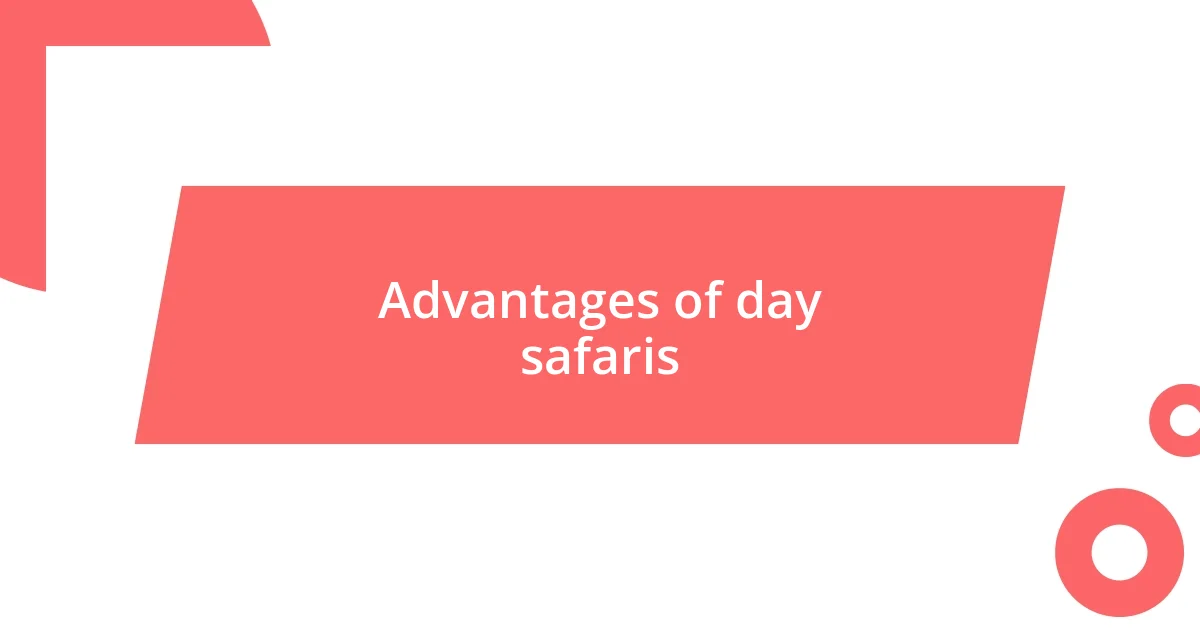
Advantages of day safaris
The beauty of day safaris lies in their vibrant, clear visibility. I remember one particular morning, the sun spilling across the savannah as a herd of zebras grazed peacefully. The sheer joy of capturing this moment on camera while the backdrop of bright blue skies enhanced every detail felt pure and exhilarating. Isn’t it fascinating how the natural light showcases the colors and textures of the landscape?
Day safaris also allow for extensive animal activity observations, which can be more challenging at night. I often reflect on how I was mesmerized by a pride of lions relaxing under the shade, their majestic frames illuminated by sunlight. This was a prime opportunity to witness their social dynamics, playfulness, and interactions with cubs. Doesn’t it feel special to be part of such intimate moments in the wild?
Another advantage I cherish is the sense of safety and comfort during the day. I recall sitting back in a safari vehicle, the gentle warmth bathing me, as we traveled for hours without the lingering uncertainties of the dark. This can be especially appealing for families or those new to the safari experience. Don’t you think the peace of daytime exploration allows for a deeper connection with both the wildlife and the environment?
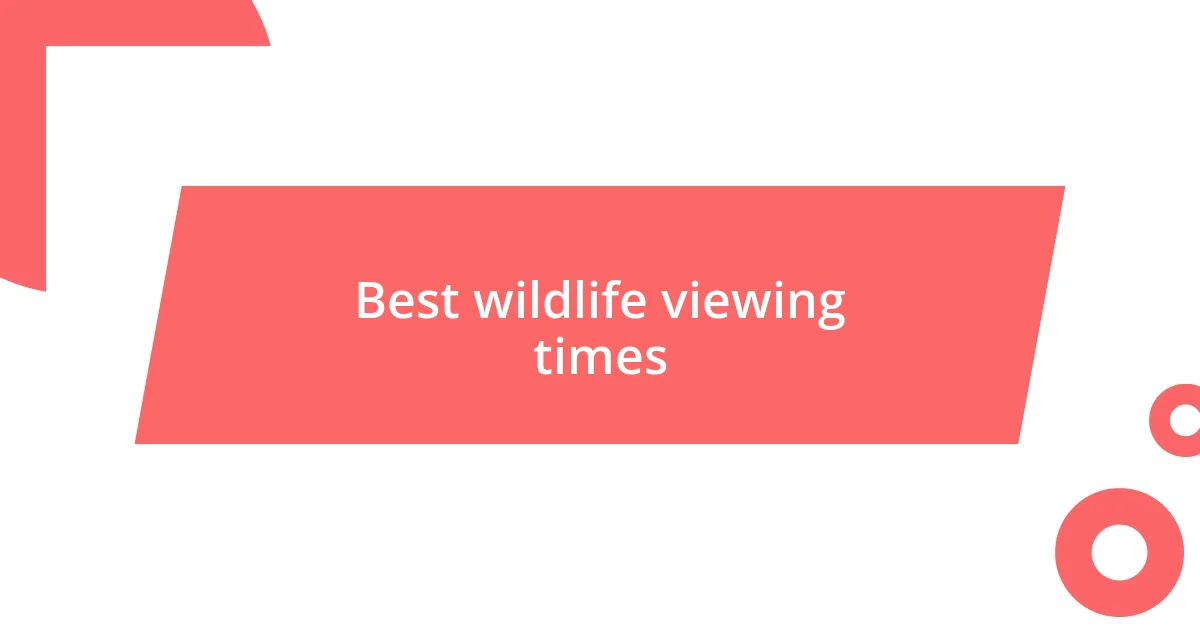
Best wildlife viewing times
When it comes to the best wildlife viewing times, both day and night offer unique advantages. Personally, I find early mornings to be a prime time for spotting animals, as they are often at their most active after a cool night. I recall one crisp dawn when I encountered a magnificent elephant family sipping from a watering hole; the serenity of the moment left a lasting impression on me. How often do we get to witness nature at its quietest, yet most vibrant?
As the sun sets, the magic of twilight creates a different atmosphere. Many predators, like lions and hyenas, start to stir, making dusk an exciting time to see them in action. I’ll never forget the thrill of watching a lioness stealthily approach her prey just as darkness enveloped the savannah. Isn’t it fascinating how the change in light can alter the entire dynamic of wildlife behavior?
In contrast, the harsh midday sun can lead to quieter wildlife moments, as many animals find shade to escape the heat. This is when I noticed that seizing opportunities, perhaps a scenic picnic stop, can lead to unexpected encounters. Once, while munching on lunch, a curious giraffe ambled closer, and I felt an instant connection. Hasn’t everyone experienced those surprise moments that make a trip truly unforgettable?






